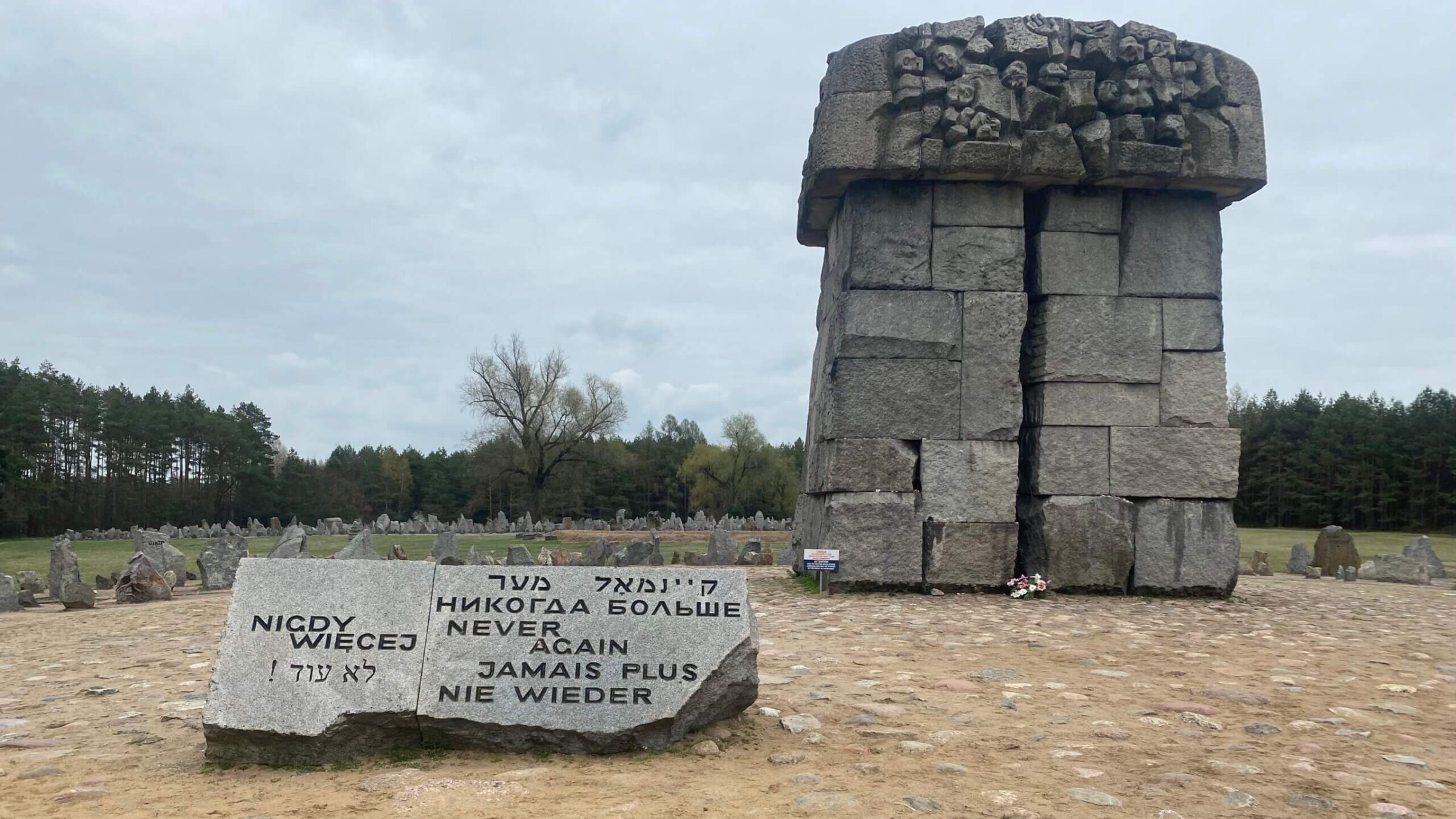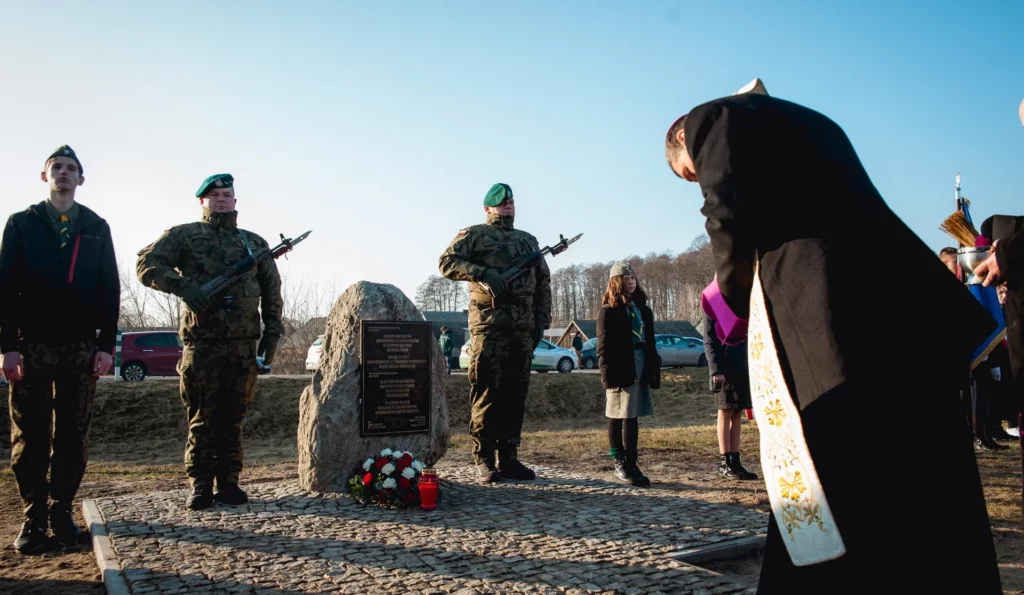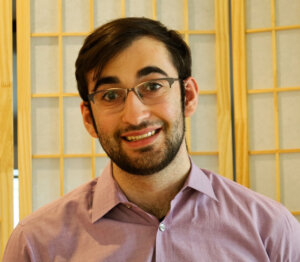What happens when nationalism seeps into Holocaust history? Look to Poland
The ruling party of Poland has pushed a nationalist interpretation of the Holocaust that obscures the full picture

The memorial site at Treblinka, the former Nazi death camp in Poland, April 26, 2022. Photo by Nora Berman
I traveled to the Treblinka memorial site in Poland this past June. It’s an isolated wooded area that housed one of the largest death camps in Nazi-occupied territories. Standing in front of that memorial, which represented the mass grave of over 900,000 murdered Jews, I knew that, close by, was the site of a more recent battle waged between the Polish government and Polish historians over how the Holocaust ought to be remembered and taught.
A short distance from the main Treblinka memorial lies another monument in honor of Jan Maletka — a Polish villager who was shot and killed by the Nazis, for offering water to Jews aboard the trains to Treblinka. This monument was unveiled in November 2021 to great fanfare by the Polish government, who heralded Maletka as a tragic hero of Poland, yet prominent historians like Jan Grabowski raised their eyebrows. Grabowski pointed out that in the absence of any evidence to suggest that Maletka acted out of virtue, the wealth of testimony left behind by Jewish victims detailing how Polish locals came to offer water only in exchange for money and valuables must be considered.
“None of this is to necessarily undermine the story of Jan Maletka and what is said to be the quiet act that cost his life,” Grabowski wrote. “There are no eyewitnesses left, so we will never know whether Mr. Maletka acted out of empathy for the dying Jews or not. But this huge memorialization effort obscures the full story.”
Nationalistic versions of history such as the memorialization of Maletka usually occur when academically agreed-upon narratives of historic events become twisted and co-opted into a vehicle to advance a misleading and dangerous distortion. Therefore, as Poland’s memory of the Holocaust has become more and more intertwined with state-sponsored nationalism, it has also become a problem for everyone who desires to learn or teach about the Shoah.
Poland’s status as the hub of many of the most important collections of evidence in the study of the Holocaust, and some of the largest international Holocaust education programs, including March of the Living, have made the country an integral force in the preservation and dissemination of Holocaust history everywhere.
Analysis of state-sponsored Holocaust discourse in Poland can be broken down into the dichotomy between a “pedagogy of shame” and a “pedagogy of pride.” The current ruling Law and Justice Party (PiS) is enacting sweeping measures to dismiss or discredit the parts of the Holocaust that implicate the country (“pedagogy of shame”) while simultaneously promoting versions of the Holocaust that bolster Poland’s national image by showcasing its resistance efforts (“pedagogy of pride”).

Beginning with their rise to power in 2015, PiS successfully popularized the slogan “down with the pedagogy of shame.” The goal is to position Poland’s right wing as a shield protecting “patriots” from the “left-wing pedagogy of shame.” In this respect, much of the same could also be said of the United States, where discussions around race in the classroom are often suppressed with a similar strategic goal in mind. Adam Serwer argued in The Atlantic that the objective of conservative efforts to change the curriculum on slavery “is not a more accurate history but one that justifies the present economic and racial hierarchy, and offers… a ‘comforting alternative to the burdens of the past.’”
PiS party members have taken public stances to cast doubt on settled Holocaust history. In 2016, Poland’s then-education minister Anna Zalewska openly questioned the legitimacy of survivor testimony of crimes committed by Polish villagers against their Jewish neighbors during the Jedwabne pogrom. The 2018 Holocaust bill, which sought to make it a punishable crime to accuse the state of Poland of complicity in the Holocaust, was a far more blatant attempt to quell discussion around parts of the Holocaust that goverment authorities find uncomfortable.
Such stances by the PiS are deeply problematic. Grabowski noted that “pushing blame for the destruction of Jewish communities entirely onto Nazi occupiers obfuscates … the very real problems of collaboration, bystanderism and local antisemitism that helped run the machine of the Holocaust.”
The newest testing ground for these distortive campaigns is the classroom. In the current school year, right-wing propaganda dressed up as objective truth is an increasingly major component of grade school education, particularly with the Education Ministry’s first-time addition of a controversial new history textbook by Wojciech Roszkowski. Roszkowski’s book has fallen under fire for presenting Poland as the biggest victim of World War II, for shifting blame for the Holocaust completely onto Nazi occupiers, and for associating feminism with Nazism.
American historian Beth Holmgren pled in 2019 for a united global response against what she described as “neofascist national narratives.” She emphasized that “the time for shared resources, joint vigilance, and transnational advocacy is now.”
An honest narrative of the Holocaust cannot thrive under this “pedagogy of pride” propagated by the Polish state. Every year, thousands of teens from around the world make the journey out to Poland to participate in its annual March of the Living. For years, genuine historical introspection has been an integral part of the promise of that program, and of all of Poland’s memorials and museums dedicated to the Holocaust. Particularly as the number of living Holocaust survivors dwindles, the effectiveness of programs like March of the Living will increasingly rely on accurate historical resources in Poland.
Studying the Holocaust teaches us to embrace empathy and reject indifference in the face of evil, and to understand that this responsibility does not end with our national border.
Poland is one of the world’s most important centers of global Holocaust study and discourse. A demise of honest Holocaust education there foreshadows the decay of empathy and accountability everywhere.
To contact the author, email [email protected].
The Forward is free to read, but it isn’t free to produce

I hope you appreciated this article. Before you go, I’d like to ask you to please support the Forward.
Now more than ever, American Jews need independent news they can trust, with reporting driven by truth, not ideology. We serve you, not any ideological agenda.
At a time when other newsrooms are closing or cutting back, the Forward has removed its paywall and invested additional resources to report on the ground from Israel and around the U.S. on the impact of the war, rising antisemitism and polarized discourse.
This is a great time to support independent Jewish journalism you rely on. Make a gift today!
— Rachel Fishman Feddersen, Publisher and CEO
Support our mission to tell the Jewish story fully and fairly.
Most Popular
- 1

Fast Forward Ye debuts ‘Heil Hitler’ music video that includes a sample of a Hitler speech
- 2

Culture Cardinals are Catholic, not Jewish — so why do they all wear yarmulkes?
- 3

News School Israel trip turns ‘terrifying’ for LA students attacked by Israeli teens
- 4

Fast Forward Student suspended for ‘F— the Jews’ video defends himself on antisemitic podcast
In Case You Missed It
-

Fast Forward Police clash with pro-Palestinian protesters in Brooklyn as Columbia library takeover fallout continues
-

Opinion This week proved it: Trump’s approach to antisemitism at Columbia is horribly ineffective
-

Yiddish קאָנצערט לכּבֿוד דעם ייִדישן שרײַבער און רעדאַקטאָר באָריס סאַנדלערConcert honoring Yiddish writer and editor Boris Sandler
דער בעל־שׂימחה האָט יאָרן לאַנג געדינט ווי דער רעדאַקטאָר פֿונעם ייִדישן פֿאָרווערטס.
-

Fast Forward Trump’s new pick for surgeon general blames the Nazis for pesticides on our food
-
Shop the Forward Store
100% of profits support our journalism
Republish This Story
Please read before republishing
We’re happy to make this story available to republish for free, unless it originated with JTA, Haaretz or another publication (as indicated on the article) and as long as you follow our guidelines.
You must comply with the following:
- Credit the Forward
- Retain our pixel
- Preserve our canonical link in Google search
- Add a noindex tag in Google search
See our full guidelines for more information, and this guide for detail about canonical URLs.
To republish, copy the HTML by clicking on the yellow button to the right; it includes our tracking pixel, all paragraph styles and hyperlinks, the author byline and credit to the Forward. It does not include images; to avoid copyright violations, you must add them manually, following our guidelines. Please email us at [email protected], subject line “republish,” with any questions or to let us know what stories you’re picking up.















